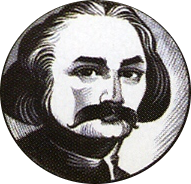David Guramishvili
| Prince დავით გურამიშვილი David Guramishvili |
|
|---|---|
 |
|
| Born | 1705 Gorisubani, Kingdom of Kartli |
| Died | 21 July 1792 Myrhorod, Russian Empire |
| Occupation | poet, thinker, prince |
| Nationality | Georgian |
| Period | Reign of King Vakhtang VI of Kartli |
| Genre | poetry |
| Notable works | Davitiani |
Prince Davit Guramishvili (Georgian: დავით გურამიშვილი) (1705 – 21 July 1792) was a Georgian poet who wrote the finest pieces of pre-Romantic Georgian literature. His poetic talents thrived far from his motherland, being forced by personal misfortunes and turmoil in Georgia to spend several years in the Russian military service until his retirement to his small Ukrainian estate at Myrhorod where he made eighty-seven years of his tragic and turbulent life into one cycle of autobiographical poetry, the Davitiani, which he sent to Georgia through a Georgian embassy returning from the Russian empire in 1787.
Born in the village of Gorisubani into the Georgian princely (tavadi) family of Guramishvili (a branch of the greater Amilakhvari house), Davit Guramishvili spent his early years in his patrimonial estate near Saguramo. As an eighteen-year-old he took part in the battle of Zedavela, which resulted in the defeat of King Vakhtang VI of Kartli at the hands of Ottoman army, Dagestani clansmen and renegade Georgians that plunged Georgia into complete anarchy. This period is chronicled in several sections of Guramishvili’s Davitiani (დავითიანი) conventionally called Georgia’s Afflictions (ქართლის ჭირი).
In 1727/8 Guramishvili was snatched from his bride by the marauding tribesmen from Dagestan and spent several months in captivity before he managed to escape and make his way on foot to the north. Through the pathless mountains, he continued his way into the Terek Valley where he encountered a Cossack station. From there, headed for Moscow and joined King Vakhtang VI’s entourage in their Russian exile. The sincere and vivid account of his imprisonment, his despair and attempts to escape, and his religious solace form the next twenty-five poems of his collection.
...
Wikipedia
